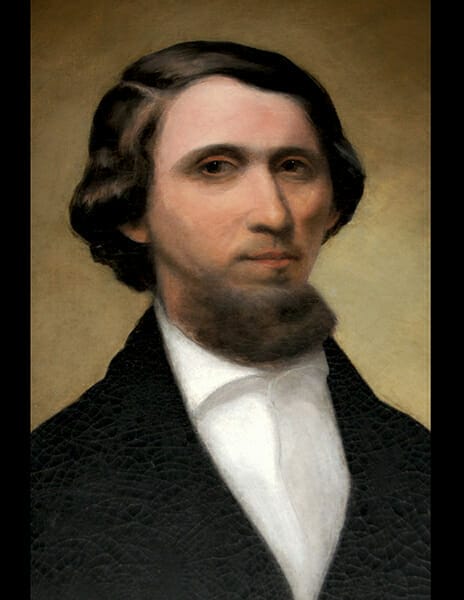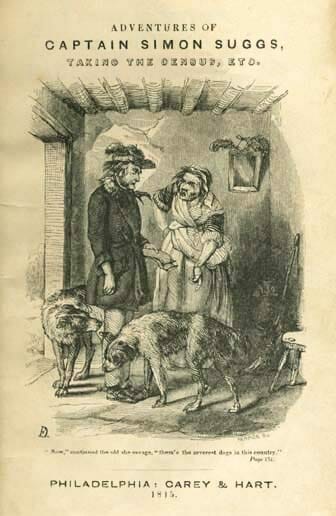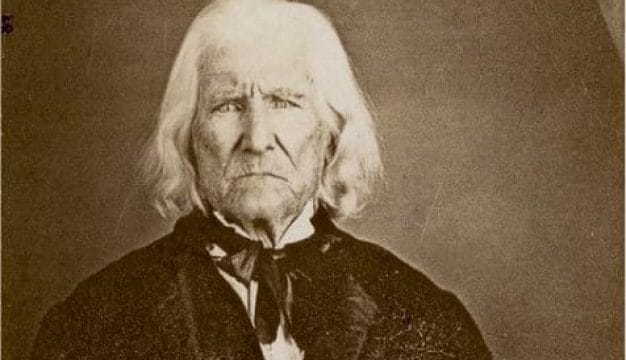Johnson Jones Hooper
Johnson Jones Hooper (1815-1862) was a southern humorist known for his stories about the archetypal trickster Simon Suggs. An attorney and staunch supporter of the Confederacy and southern rights, Hooper used his experiences in rural Alabama to form his stories, now classified in the genre of Old Southwestern Humor along with other Alabama writers such as Joseph Glover Baldwin and Thomas Kirkman.
 Johnson Jones Hooper
Hooper was born in Wilmington, North Carolina, on June 9, 1815, to Archibald Maclaine Hooper and Charlotte de Berniere Hooper; he was the youngest of three brothers. He worked in North Carolina with his father in the printing industry. At the age of 15, Hooper showed the promise of humorous writing to come when he composed the poem “Anthony Milan’s Launch.” Set during a ship christening ceremony, the poem describes the mistaken throwing, or “launching,” into the river, of a portly and pretentious British Consul.
Johnson Jones Hooper
Hooper was born in Wilmington, North Carolina, on June 9, 1815, to Archibald Maclaine Hooper and Charlotte de Berniere Hooper; he was the youngest of three brothers. He worked in North Carolina with his father in the printing industry. At the age of 15, Hooper showed the promise of humorous writing to come when he composed the poem “Anthony Milan’s Launch.” Set during a ship christening ceremony, the poem describes the mistaken throwing, or “launching,” into the river, of a portly and pretentious British Consul.
In 1835, Hooper moved to Alabama, settling in LaFayette, Chambers County, where he studied law with his brother. He passed the bar in 1838 and began working in his brother’s law firm. In addition to practicing law, Hooper worked as a census taker for Tallapoosa County. Hooper’s experiences surveying the lives of the backwoods residents of Tallapoosa County served as rich material for his writing career.
In 1843, Hooper published his first story, “Taking the Census in Alabama,” in William T. Porter’s national magazine, Spirit of the Times. Readers praised the story for its realistic and humorous portrayal of the people of Tallapoosa County, and Hooper consequently gained a national audience.
 The Adventures of Simon Suggs
At Porter’s suggestion, Hooper began writing more humorous stories, most notably those featuring his best-known character Simon Suggs, the first of which appeared in 1844 in the East Alabamian, which Hooper edited. The Simon Suggs stories garnered national fame and grew so popular that they were collected in a book, published in 1845. The tales usually involved the mischievous exploits of Simon Suggs, such as his putting gunpowder in his mother’s tobacco pipe and finagling his way into land grabs.
The Adventures of Simon Suggs
At Porter’s suggestion, Hooper began writing more humorous stories, most notably those featuring his best-known character Simon Suggs, the first of which appeared in 1844 in the East Alabamian, which Hooper edited. The Simon Suggs stories garnered national fame and grew so popular that they were collected in a book, published in 1845. The tales usually involved the mischievous exploits of Simon Suggs, such as his putting gunpowder in his mother’s tobacco pipe and finagling his way into land grabs.
Hooper used Suggs’s widespread popularity not only to entertain, but also for political purposes. He was a fervent supporter of the Confederacy and frequently employed Suggs to promote his own political beliefs. For example, Suggs is a self-made man who works outside the law, a characterization that perhaps reflects Hooper’s devotion to the cause of southern states’ rights.
Hooper married Mary Mildred Brantley in 1845, and they had two sons, William and Adolphus. Hooper’s political and editorial career was a busy one. He edited the East Alabamian (1844), the Wetumpka Whig (1845), the Alabama Journal (1846), and the Chambers County Tribune (1849-1854).
In 1849, Hooper started a four-year term as Alabama State Prosecutor and also published a new collection of stories, A Ride with Old Kit Kuncker, and Other Sketches, two of which are Suggs tales. This collection draws on Hooper’s experiences as a lawyer in rural Alabama. At this point in Hooper’s life, he began to feel that his Simon Suggs stories were overshadowing his political interests. He left Montgomery and the Alabama Journal, and moved to LaFayette and resumed his law practice; he also took over the editorship of the Chambers County Tribune (1849-1854). In 1854, Hooper co-founded the Montgomery Mail.
In addition to his editorial posts, Hooper held a prominent place in Confederate politics. In 1861, Hooper moved to Richmond, Virginia to begin work as editor of the records of the Confederacy’s Provisional Congress. Having suffered from tuberculosis for some time, Hooper died in Richmond on June 7, 1862. His picaresque and humorous tales of his anti-hero, Simon Suggs, remain popular with audiences even today.
Works by Johnson Jones Hooper
Some Adventures of Captain Simon Suggs, Late of the Tallapoosa Volunteers (1845)
A Ride with Old Kit Kuncker, and Other Sketches, and Scenes of Alabama (1849)
The Widow Rugby’s Husband (1851)
Dog and Gun (1856)
Simon Suggs’ Adventures (1858)
Further Reading
- Hoole, William Stanley. Some Adventures of Captain Simon Suggs: The Life and Times of Johnson Jones Hooper. Tuscaloosa: University of Alabama Press, 1952.
- Phillips, Robert. L, Jr. “Johnson Jones Hooper (1815-1862).” In Fifty Southern Writers Before 1900: A Bio-Bibliographical Sourcebook, edited by Robert Bain and Joseph M. Flora. Westport, Conn.: Greenwood Press, 1987.
- Sharp, Ann Wyatt. “Some Adventures of Captain Simon Suggs: The Legacy of Johnson Jones Hooper.” In No Fairer Land: Studies in Southern Literature Before 1900, edited by J. Lasley Dameron and James W. Matthews. Troy, N.Y.: Whitson Publishing, 1986.
- Shields, Johanna. “A Sadder Simon Suggs: Freedom and Slavery in the Humor of Johnson Jones Hooper.” Journal of Southern History 56 (November 1990): 641-64.
- Treadaway, James L. “Johnson Jones Hooper and the American Picaresque.” Thalia 6 (Fall-Winter 1983): 33-42.



